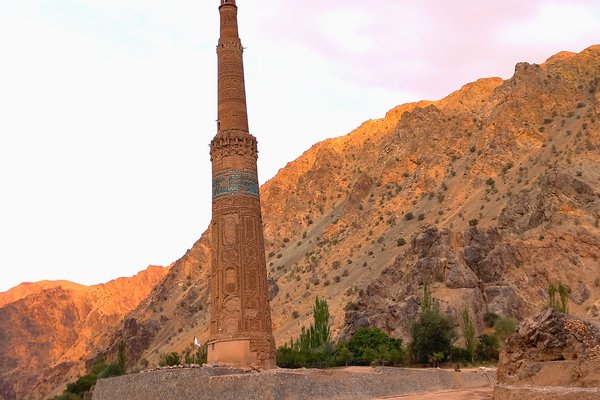Afghanistan
Minaret of Jam
The Minaret and Archaeological Remains of Jam comprise a masterwork of Islamic architecture and decoration.
The well-preserved minaret and its surrounding remains are the products of the Ghurid civilization, which in the 12th and 13th centuries controlled not only Afghanistan but also parts of eastern Iran, Northern India and parts of Pakistan. The 65-metre-high minaret is built entirely of baked bricks, with intricate brick, stucco and glazed tile decorations such as alternating bands of calligraphy, geometric patterns, and verses from the Qur'an.
Community Perspective: this site has been rarely visited in the past. Since the most recent takeover by the Taliban in 2021, tourists have been reaching it again. Wojciech was the first to capture a visit in a review.
Site Info
Official Information
- Full Name
- Minaret and Archaeological Remains of Jam (ID: 211)
- Country
- Afghanistan
- Status
-
Inscribed 2002
Site history
History of Minaret of Jam
- 2002: In Danger
- Lack of protection
- 2002: Inscribed
- Inscribed
- 1983: Deferred
- Deferred until receipt of necessary info
- In Danger
- Lack of protection Since 2002
- Type
- Cultural
- Criteria
- ii
- iii
- iv
Links
- UNESCO
- whc.unesco.org
All Links
UNESCO.org
- whc.unesco.org — whc.unesco.org/
News Article
- May 30, 2019 thedefensepost.com — Taliban attack Afghanistan world heritage site, killing security forces
- May 29, 2019 thehindu.com — Afghan floods put famous minaret at risk of collapse
Community Information
- Community Category
- Religious structure: Islamic
Travel Information
One thousand visitors or fewer
Red Zone Travel Advisory
Most Remote Cultural WHS
Recent Connections
-
Red Zone Travel Advisory
Afghanistan fully off-limits -
One thousand visitors or fewer
DD : “There are no statistics of visito… -
Most Remote Cultural WHS
hub Herat or Bamyan, both taking some 1…
Connections of Minaret of Jam
- History
-
-
Located in a Former Capital
possibly the Turquoise Mountain, the lost medieval Afghan (Ghurid) capital until 1220 -
Silk Roads
(Near) Southern Land Route; in ICOMOS thematic study but no details on role or functionSee en.unesco.org
-
- Architecture
-
-
Octagons
The circular minaret rests on an octagonal base. (wiki) -
Double Helix
"containing a double helix stairway" -
Glazed tiles
-
Brick architecture
-
- Damaged
-
-
Destroyed during invasion
The city of Firuzkuh where it was located was apparently destroyed by the Mongols
-
- World Heritage Process
-
-
Slow Starters
1979-2002 : 23 years -
Ten years or more to inscribe
1983-2002 -
Directly in Danger
Emergency Inscription -
First inscriptions
Afghanistan 2002
-
- Religion and Belief
-
-
Jewish religion and culture
Tombstones written in Hebrew, probably from a nearby Jewish cemetery, which indicate the presence of a sizable Jewish community
-
- Constructions
-
-
Leaning Tower
"The tower has started to lean, but stabilisation work is in progress to halt this danger." (Wiki) -
Notable minarets
65m high
-
- Timeline
-
-
Built in the 12th century
An inscription gives the date of construction as 1174 (AB)
-
- Visiting conditions
-
-
One thousand visitors or fewer
DD : “There are no statistics of visitors available. There are no visitor facilities, as the rest house built in the 1970's was destroyed during the civil unrest years.” (nom file) -
Red Zone Travel Advisory
Afghanistan fully off-limits -
Most Remote Cultural WHS
hub Herat or Bamyan, both taking some 13 hours to reach
-
News
- thedefensepost.com 05/30/2019
- Taliban attack Afghanistan world h…
- thehindu.com 05/29/2019
- Afghan floods put famous minaret a…
Community Reviews
Show full reviews
The Minaret of Jam is an almost legendary place. For at least 20 years, from 2001 to 2021 (though actually since the outbreak of the Afghan war in 1978), it was completely inaccessible to visitors. During the US intervention, the mountains around it were a Taliban hotbed and were not controlled by the Afghan government or US military. After the Taliban took power, it is open again, which I took advantage of by visiting this place in September 2024 with a group of seven like-minded travelers from Poland (including three women).
The minaret is very difficult to access. You can get to it from May to October via terrible roads. The road from Herat takes 13 hours (including breaks), the road to Bamyan takes up to 13.5 hours. And these are only 200 and 300 kilometers, respectively. Despite this, it is quite popular - our fixer announced that he has run his 25th group here in three years. But it is still a challenge, depending on the weather. In May 2024, a huge flood destroyed some of the access roads and bridges, and to get to the minaret it was necessary to cross the river on a rope. The road looks a bit better now, the bridge has been built in a different place... until the next spring flood?
The last dozen or so kilometers to the minaret is an extremely difficult road in the high mountains. Finally, IT emerged from behind the rock - an absolutely extraordinary …
Keep reading 0 comments

